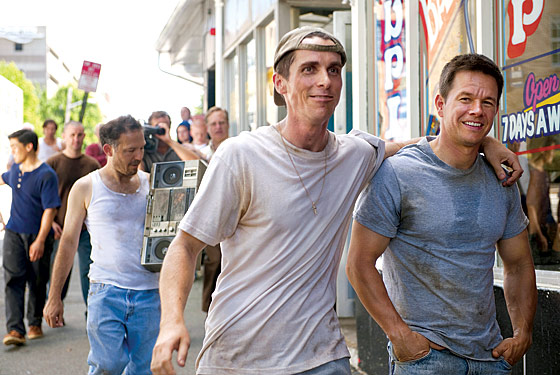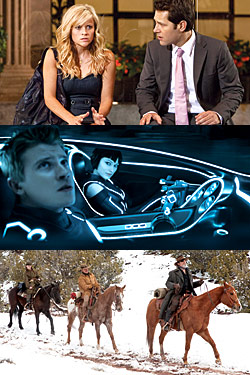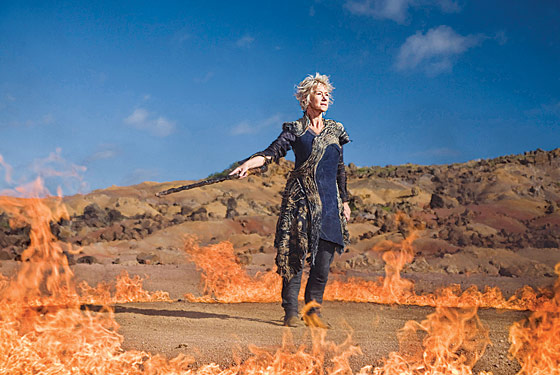
Good news: The Fighter is mistitled. It’s not about another raging bull. It’s about a whole raging family: bulls, cows, even raging heifers. It opens in 1993 in the blue-collar section of Lowell, Massachusetts, where the punching doesn’t stop at the ropes and the air is alive with epithets: Ya junkbag, ya skank, ya cheap bastahd. At last, the famously pugilistic filmmaker David O. Russell (George Clooney in a Playboy interview: “He turned on me and said … ‘You want to hit me? You want to hit me? Come on, pussy, hit me.’ I’m looking at him like he’s out of his mind. Then he started banging me on the head with his head”) has found a set of characters more quarrelsome than he is: two half-brothers, Micky Ward (Mark Wahlberg) and Dicky Eklund (Christian Bale); Micky’s bartending squeeze, Charlene (Amy Adams); their boozy bottle-blonde mom, Alice (Melissa Leo); and their fearsome armada of big-haired sisters. Ironically, the title character, Wahlberg’s Micky, is the movie’s peacemaker. He just wants everyone to get along so he can pummel people outside the family to a pulp.
The Fighter takes a while to find its footing. It opens in a faux-documentary style, with the emphasis on faux: Once again, Massachusetts accents prove to be the kryptonite of superstars. (Even Wahlberg can’t nail the tricky Lowell dialect.) Bale’s Dicky, once a boxer and the “pride of Lowell,” is now the subject of an HBO whatever-happened-to doc he thinks is meant to herald his comeback. But it’s actually about how he became a crackhead—which is bad for Dicky but good for Bale, who gets a chance to do one of those overcommitted-Method-actor transformations, which leaves him with bones popping out of his sallow flesh. He’s terrific, but, you know, ick. It’s the faded junior welterweight Micky, now working in construction, who decides to give the ring one more shot and who ends up getting the boost from HBO. In this he is assisted—and prodded, and sometimes browbeaten—by his new girlfriend.
It falls to Charlene to pry Micky loose from his druggie brother and loudmouthed mom, and Amy Adams—in the past such an airy-fairy and ethereal little nun—has accomplished her own transformation. She has gained weight: not much but enough to give her a cute tum and make her arms look like they’re used to heaving multiple pitchers of lager. And with her eyes like blue steel and swarm of red hair, it doesn’t take much to get her Irish up. The Fighter really takes off when her Charlene goes up against Mama Alice, who calls her, mystifyingly, “an MTV girl” but is finally forced to respect her titanic will. You get the feeling that Leo, a full-throttle scenery chewer, was forced to respect Adams, too: It’s mano-a-mano in that nutty Best Supporting Actress category.
Director Russell reportedly signed on late in the game, when Darren Aronofsky dropped out to punish ballerinas instead of boxers, and his filmmaking is loose and spontaneous. The themes don’t snap into focus—I’d have liked a nod to the irony that HBO sells Dicky’s downfall as avidly as Micky’s rise—but the movie has so much texture that once it gets you, you’re good and got. The real Micky Ward was known for taking loads of punishment, and the fighting is brutal. But Russell doesn’t stylize the bouts or go for Raging Bull–style slo-mo crucifixion poetry. You’re always aware of the people outside the ropes screaming at Micky, who seems to feed on all that family drama, to suck it in the way Popeye sucked in spinach. The Fighter suggests that a seedy, nasty milieu can knock you down but also pick you up and shove you back in the ring to keep punching. It’s a rousing picture.
What moved Joel and Ethan Coen to adapt Charles Portis’s 1968 novel True Grit for the screen anew, 40-plus years after John Wayne made the one-eyed Marshall “Rooster” Cogburn his own? My guess is that they were turned on by Portis’s voice, his mixture of quasi-biblical dialect and morbidly funny modern fatalism. The novel is structured like an old-fashioned revenge saga, except the villain is a hapless cretin and the hero a mean drunk who rode with the Confederate Captain Quantrill during the infamous Lawrence, Kansas, massacre of 1863. Director Henry Hathaway was too old-school to underline the sick jokes, and Wayne had a mythical persona to uphold. The Coens signal their intentions by replacing the Duke with the Dude (Jeff Bridges) and introducing him—or rather, his voice—from inside an outhouse. Behind the walls he sits, churlishly refusing to engage with Mattie Ross (Hailee Steinfeld), a 14-year-old who seeks a man with “true grit” to help her capture her father’s killer. At that point, all we can tell is that Cogburn has true shit.

The Coens’ True Grit isn’t as momentous an event as you might hope, but once you adjust to its deliberate rhythms (it starts slowly), it’s a charming, deadpan Western comedy. It’s true that “charming” is an odd description for a picture with so much death and ghoulish imagery. But the Coens rarely get worked up about such things. Their gaze is steady, serene. Roger Deakins’s cinematography is beautifully deep-toned and austere; the compositions are clean even when the settings and characters are muddy. Hathaway shot the same old Arizona–New Mexico buttes we know from other John Wayne movies, but this True Grit is where it belongs, in high deserts and forests denuded by winter. Carter Burwell’s elegiac score is built on Christian spirituals, with a hint of Joplin’s piano rags to come. It’s all played straight—except when it comes to the actors.
Bridges’s Rooster is half-hidden behind unruly facial hair, his cheeks reddened by burst blood vessels, his one unpatched eye bleary. The actor has lowered his voice, dropped it down into a pool of tobacco juice and phlegm, and the words that come out are only semi-recognizable. It takes a while to warm up to this anti-Duke, but the nice thing about Bridges is that he can wait. He catches you off guard with great Portis lines that Wayne threw away, like: “Your partner’s killed you, and I’ve done for him.” Matt Damon’s Texas Ranger LaBoeuf is a wonderful foil, with his ostentatious jangling spurs and fringed jacket and ridiculous pipe. He’s a preener, a kid playing dress-up, but damned if he doesn’t live up to his inflated self-image. Steinfeld is their straight man, and I came to like her prim little unsmiling face and Gatling-gun delivery. It must have been hard to keep from laughing in the scene when Mattie finally comes face to face with her father’s murderer, played by Josh Brolin as a bewildered troglodyte. What the hell is Brolin doing? I think I know. By this point in the film, he has to out-grotesque an army of grotesqueries to make Joel and Ethan laugh.
Although it falls off precipitously, it’s better to have Julie Taymor’s The Tempest than not: The first half-hour is nearly as unfettered as Shakespeare’s language. Shooting on Hawaii’s Lanai, where cliffs of volcanic rock border rainforest bordering desert, Taymor suits the landscape to the words. Whenever the wizard Prospero—or, as played by Helen Mirren, Prospera—summons her enslaved spirit Ariel, the screen goes electric with FX. Ben Whishaw is the genie of one’s dreams: semi-transparent, his chiseled visage shifting in an instant from mischievousness to melancholy. He soars into the air leaving coils of himself in his wake, then serenades the tempest-tossed (in songs set by Elliot Goldenthal) in an ethereal tenor. To think what Taymor might do with Puck or the three witches!
Even in those early scenes, though, there are signs of trouble. The landscape is so remarkable it’s hard to credit Prospera with stage-managing the shipwrecked party’s illusory ordeals. And Mirren is small-scaled, snippy, without much variety or vocal power. Changing Prospero’s sex has its ups and downs. Her brother’s usurpation of her dukedom becomes an injustice against her womanhood, which works fine. What doesn’t is that this raging feminist would go on to use her magic to orchestrate the marriage of her naïve daughter, Miranda (Felicity Jones), to Prince Ferdinand (Reeve Carney). Wouldn’t she want Miranda to exercise free will? I would—but I’m biased. Jones is a dish and can speak the verse, while Carney, though pretty, swallows his words and sings off-key. Miranda could do better.
The Tempest is the most plotless of Shakespeare’s masterpieces, and even the best productions have a hard time establishing a credible threat to Prospero’s authority. The African-born Djimon Hounsou makes a grand entrance as Caliban, rising nearly naked from the earth with patches of cracked soil in place of skin, but he’s stuck bellowing all his lines at the most misdirected troupe of comic-relief plotters (among them Russell Brand and Alfred Molina) in the annals of Shakespeare films. The drama is so muddled that Shakespeare seems to be getting in the way of Taymor’s spectacle, the magic long gone by the time Prospera hurls her staff off into the sea.
With a million times more computing power at its disposal than its 1982 predecessor, Tron: Legacy still looks like Disco Night at the jai alai fronton. Twenty- eight years later, Sam Flynn (Garrett Hedlund), the son of the original’s Kevin Flynn (Jeff Bridges), gets sucked into digital space, where he’s menaced by his father’s fascist digital double and spirited away by a gorgeous, cat-eyed femme (Olivia Wilde) with a Louise Brooks ’do in a neon-outlined black bodysuit. (“Patience, Sam Flynn—all your questions will be answered soon.”) Given the strain of staring at this dim blue digital screen, it’s no hyperbole to say that Wilde is a sight for sore eyes.

The stars in How Do You Know look as if they’ve been sucked into digital rom-com space, where writer-director James L. Brooks explains that the rules are different in this world and everyone must pull as many faces as possible if he or she wants to get to a higher plane of existence. Reese Witherspoon works her big jaw and pops her eyes and always seems on the verge of saying “Shoot!” or “Dagnabbit!” She’s going for Mary Tyler Moore but comes off like a blonde, overcaffeinated morning-talk-show hostess. Paul Rudd plays the adorable young corporate executive unjustly accused of fraud who tries to win Reese by being moony and clutchy and parading his insecurities—normally a good way to get slapped with a restraining order but here meant to seem irresistible. As the sweet but slow-witted pro-baseball horndog who turns possessive whenever Reese shows signs of independence, Owen Wilson takes something off his delivery, and his wobbly curve balls catch the side of the plate: Playing the dumb guy, he’s the only one who shows any intelligence.
The sad part is that How Do You Know is nowhere near as dumb as it looks. A couple of comic set pieces are inspired—or would be, if Brooks’s timing weren’t off. Accustomed to a slower brand of dramaturgy, he can’t master the glib modern rom-com chick-flick shorthand, so every scene takes twice as long to get half as far as we expect. And those scenes are painful. As Rudd’s rich dad, Jack Nicholson—who won Oscars in two of Brooks’s other films—flails his arms and lurches around and runs out of breath and has never looked less like a movie star. Seeing Nicholson purged of charisma, you know there’s a rupture in the space-time continuum.
Note: This review of The Fighter originally ran on Vulture.
The Fighter
Directed by David O. Russell
Paramount Pictures. R.
True Grit
Directed by Ethan Coen, Joel Coen
Paramount Pictures. PG-13.
The Tempest
Directed by Julie Taymor
Touchstone Pictures. PG-13.
Tron:Legacy
Directed by Joseph Kosinski
Walt Fisney. PG.
How Do You Know
Directed by James L. Brooks
Columbia Pictures. PG-13.
E-mail: filmcritic@newyorkmag.com.
